| Srl | Item |
| 1 |
ID:
181205
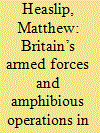

|
|
|
|
|
| Summary/Abstract |
Gallipoli left a lasting impression upon both the countries that participated and many that did not. It has been argued that the campaign negatively influenced Britain’s interwar amphibious preparations. Instead, this article will show that Britain’s armed forces were largely unaffected by such memories, and maintained their relative global standing in theory, equipment and training exercises for landing operations. The paper also highlights the role of amphibious warfare in fighting the many ‘little wars of Empire’ during the period.
|
|
|
|
|
|
|
|
|
|
|
|
|
|
|
|
| 2 |
ID:
167192
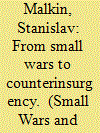

|
|
|
|
|
| Summary/Abstract |
The complicated problematic of Imperial Policing in many respects still comes down to the principle of minimum force, and much of what we consider an integral part of the modern doctrine of counterinsurgency, is perceived as by-product of post-1945 colonial experience. Charles Gwynn wrote about it in his still underestimated text-book on internal security, ‘Imperial Policing’. As a result, there is a lack of clear understanding how colonial (based on local experience) knowledge was transformed into the expert (universal, transferable) knowledge in confronting rebellions at the doctrinal level. This article examines the work of Gwynn as part of a transitional stage from the age of global empires to the age of nuclear superpowers within the context of internal security doctrine. Adaptation to the new realities during the interwar period and after the World War II – reconfiguration of the British army epistemological system in confronting insurgencies – was a hard process. In this sense, the question about transformation of colonial knowledge into expert knowledge onto the field of internal security is a part of a more general and sensitive question about transition from colonialism to the post-colonial age.
|
|
|
|
|
|
|
|
|
|
|
|
|
|
|
|
| 3 |
ID:
181039
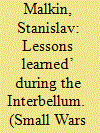

|
|
|
|
|
| Summary/Abstract |
Historians generally view the Irish War of Independence as the first and largely unsuccessful experience for the British army in conducting modern counterinsurgency. This article argues that during the Interbellum the ‘Irish war’ became a starting point for the military thought about this type of conflict, although this did not become fully consolidated in the army’s thinking. Some important aspects of the British forces’ conduct in the ‘Irish war’ remained undervalued, not least because of the only official analysis of this conflict, ‘The Record of the Rebellion in Ireland’, was classified for a long time. It strongly challenges traditional and revisionist understanding of this conflict and its implications on the British way of counterinsurgency during the Interbellum. These contradictions between documentary evidence from archives and established methods of historical thinking, as well as correlations of archival material with our understanding of modern counterinsurgencies, will be contrasted and analysed in this article.
|
|
|
|
|
|
|
|
|
|
|
|
|
|
|
|
| 4 |
ID:
092308
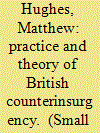

|
|
|
|
|
| Publication |
2009.
|
| Summary/Abstract |
This article details two largely unreported atrocities by British forces operating against Arab rebels during the Arab revolt, 1936-9, at the Palestinian villages of al-Bassa and Halhul. It then examines the military-legal system that underpinned and authorised British military forces operating in aid of the civil power, suggesting that the law in place at the time allowed for a level of reprisals and punitive actions, such as happened at al-Bassa and Halhul. The article does not conclude that the law allowed for atrocities but it does argue that it gave a basic form and understanding to an operational method that was brutal and could lead to atrocities. It thus tests the idea in much of the literature on counterinsurgency that the British were restrained and used minimum force when compared to other colonial and neo-colonial powers fighting insurgents.
|
|
|
|
|
|
|
|
|
|
|
|
|
|
|
|
| 5 |
ID:
116253
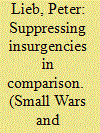

|
|
|
|
|
| Publication |
2012.
|
| Summary/Abstract |
In recent years two theories have emerged in academia with regards to 'small wars': A 'German way of war' and a 'British way of war'. The first one believes in a specific German military culture until 1945 accepting mass violence against civilians to quell any form of civil unrest. The second theory stresses a moderate British approach during the twentieth century; in defeating insurgencies the British Army had applied 'minimum force'. This article challenges both views by looking into two largely forgotten counter-insurgency campaigns by the end of the First World War: The Germans in the Ukraine in 1918 and the British in Mesopotamia in 1920. It will be argued that one cannot speak in general terms about a ruthless German and a moderate British approach during this period - in fact it was quite the contrary in some ways.
|
|
|
|
|
|
|
|
|
|
|
|
|
|
|
|